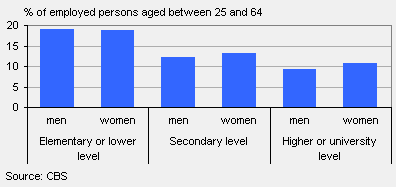People in lower-level occupations feel less healthy

People working in jobs at elementary or lower level feel less healthy than those employed in higher-level jobs. Unemployed and disabled people also rate their own health as less good than employed people.
One in five people in lower-level jobs feel less healthy
Nearly one in five people working in elementary or lower-level positions (e.g. shop assistants, window cleaners and lorry drivers) rate their own health as less good. The rate for people working in jobs at higher or university level (e.g. teachers, managers and doctors) is one in ten. The difference in perceived health status between the various occupational levels is larger in the male than in the female working population.
Perceived health status by occupational level and gender, 2004/2008

In particular older people in lower jobs feel less healthy
One quarter of people in the age category 50-65 working in elementary or lower-level jobs do not feel very healthy. The proportion is much higher than among young people working at this level. At other occupational levels, older people also rate their own health as less good than young people. The effect of age is more obvious in men than in women.
Perceived health status by occupational level and age, 2004/2008

Unemployed and disabled feel less healthy than employed people
The proportion of people who rate their own health status as poor is twice as high among unemployed persons as among employed persons. More than three quarters of disabled persons feel less healthy. This is not surprising, given the fact that bad health is often at the basis of disability. Only younger disabled relatively often perceive their own health status as good or very good.
Perceived health status by situation on the labour market, 2004/2008

Jan-Willem Bruggink